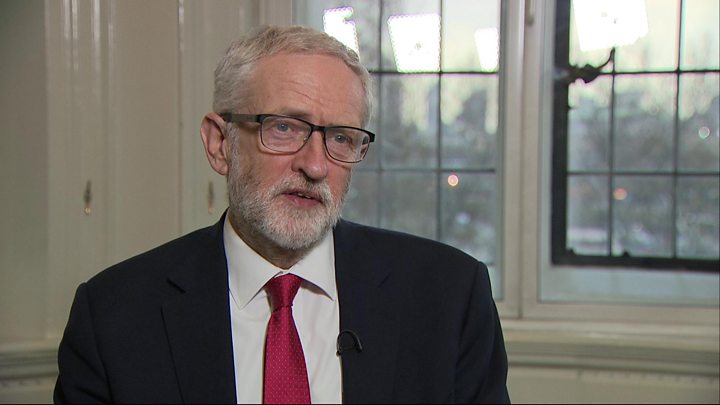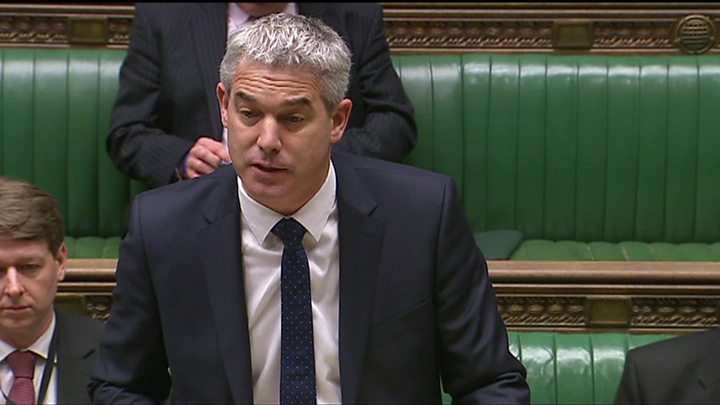Brexit: Cross-party talks enter second day
 Image copyright EPA
Image copyright EPA Talks between Conservative and Labour teams are taking place for a second day as they try to end the Brexit deadlock.
It follows discussions between Theresa May and Jeremy Corbyn on Wednesday, which were described as “constructive”.
EU chief negotiator Michel Barnier said he welcomed the “cross-party dialogue”, adding: “It’s time for decisions.”
It comes after MPs voted by a majority of one to force the PM to ask for an extension to the Brexit process, in a bid to avoid a no-deal scenario.
The House of Lords has begun to debate whether or not to consider the bill, which will need their approval to become law.
But ultimately it is the EU which decides whether to grant an extension. European Commission Vice-President Jyrki Katainen said a no-deal Brexit was “highly likely” despite Parliament proceeding with legislation to prevent it.
The UK is due to leave the EU on 12 April, if an extension is not granted.
Arriving for the latest round of Conservative-Labour talks, shadow Brexit secretary Sir Keir Starmer said the idea of a “confirmatory” referendum would be discussed.
“We have been discussing Labour’s alternative plan and issues such as confirmatory votes,” he said.
“We had discussions yesterday and we are going to continue them today.”
Chancellor Philip Hammond has said he expects Brussels to insist on a lengthy delay to Brexit. He also described a public vote to approve any final deal as “a perfectly credible proposition”.
But Health Secretary Matt Hancock told BBC Radio 4 Today he was “very strongly against” a public vote and he would not want to see a long extension to Brexit.
The cross-party talks have provoked strong criticism from MPs in both parties, with two ministers resigning on Wednesday.
Reports in papers including the Sun suggest as many as 15 more – including several cabinet ministers – could follow if Mrs May strayed too far from previous commitments.
Among Mrs May’s “red lines” was leaving the EU’s customs union, which allows goods to move between member states without being subject to tariffs. It also imposes the same tariffs on goods from outside countries.
Labour wants a new permanent customs union with the EU, while Northern Ireland’s Democratic Unionist Party – which props up Mrs May’s government – indicated on Wednesday that it could support the idea.
A No 10 spokesman said that both parties showed “flexibility” and “a commitment to bring the… uncertainty to a close” during Wednesday’s talks.

Media playback is unsupported on your device
Mr Corbyn said the meeting was “useful, but inconclusive”, adding there had not been “as much change as [he] had expected” in the PM’s position.
The prime minister wants to agree a policy with the Labour leader for MPs to vote on before 10 April – when the EU will hold an emergency summit on Brexit.
But if they cannot reach a consensus, she has pledged to allow MPs to vote on a number of options, including the withdrawal agreement she has negotiated with the EU, which MPs have already rejected three times.
In either event, Mrs May said she would ask the EU for a further short extension to Brexit in the hope of getting an agreement passed by Parliament before 22 May, so that the UK does not have to take part in European elections.
Bill ‘passed in haste’
On Thursday, Brexit Secretary Stephen Barclay told MPs he would hope the Lords would “scrutinise this bill passed in haste with its constitutional flaws”.
He added that there was “no guarantee” that the UK will not take part in the European elections in May and to participate would be a “betrayal” and “inflict untold damage”.

Media playback is unsupported on your device
Ms Cooper’s attempts to prevent a no-deal departure from the EU passed by 313 votes to 312.
Tory Brexiteers expressed frustration at the unusual process of a backbench bill clearing all stages in the Commons in a matter of hours, rather than months.
Responding to the Commons vote, the government said the bill would place a “severe constraint” on its ability to negotiate an extension to the Brexit deadline before 12 April, the date the UK is due to exit.
Media playback is unsupported on your device







